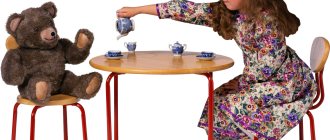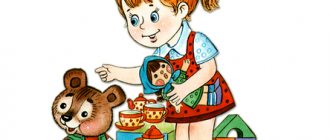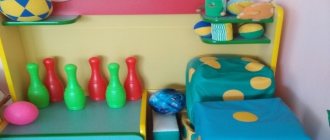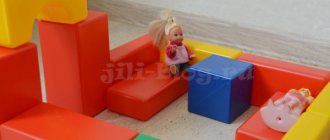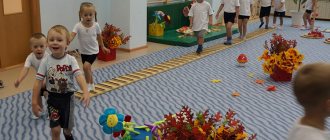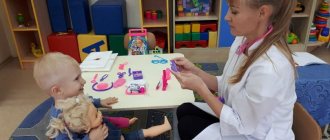How quickly our children grow up! It seems like just yesterday the baby was struggling to hold a rattle in his little hands and watched with interest the movement of the mobile, but today he is already putting his doll to bed, funny copying your words and intonations. This means that the time has come for role-playing games. Their importance in the development of children is very great. They teach you to evaluate actions, recognize yourself as part of a team, and quickly learn the rules of behavior. Read about what types of role-playing games there are and what significance they have for preschoolers in our article.
Types of role-playing games
When talking about story-based games, many people only think of “mother-daughter games” or “war games.” These are indeed some of the most common entertainments, but they are far from the only ones. Children's imagination is capable of simulating hundreds of variants of unique “theatrical performances”, where everyone can try on the role they like and convey its peculiarity and character. There are a lot of story-based games; they can be divided into several groups: staged, social, everyday, patriotic and based on the plots of literary works. Let's take a closer look at each type.
Staged
In such games, the child himself comes up with a scenario and, as a rule, speaks for all participants in the production. The basis is taken from fairy tales, cartoons or real life situations. Children teach dolls to act in accordance with the role assigned to them, endowing them with imaginary characters. The production type can be described in one phrase - “You are your own director.”
Public
This type of entertainment reflects people's work activities. For these fun topics, the themes are taken from the surrounding life and are based on the knowledge that the child has managed to acquire. Hospital, kindergarten, school, post office, hairdresser, circus, theater, house construction, police, firefighters - the list goes on and on. To become full-fledged, such classes require special “props”: thematic kits for a doctor, policeman or fireman, tools for creating hairstyles, cubes for constructing structures.
Household
Kids love to play family. They happily babysit, raise “children,” and organize holidays and birthdays. Often during the game, through dolls, children express what worries or worries them, and show relationships in their family. Take a closer look and listen to what the child says and what emotions he experiences. Maybe it's time to adjust your behavior and remove negative aspects from communication with others. After all, it turns out that the “unreasonable” child understands everything and is very worried.
Patriotic
It's hard to find a boy who wouldn't love to play war and feel like a hero fighting enemies. Such fun is necessary for the development of masculine character traits, familiarization with the concepts of “honor”, “duty”, “conscience”, “fatherland”. Of course, for entertainment of this kind you will need a whole arsenal of weapons: from medieval swords to modern blasters. The more diverse the weapons are, the more scenarios can be offered to the little defenders of the humiliated and insulted. They will be able to become epic heroes and fight against “filthy monsters,” brave scouts, fearless soldiers from the Second World War, or liberators of an unknown planet captured by evil monsters.
Based on literary stories
In these games, children live out entire episodes from read fairy tales, movies or favorite cartoons. They imitate the heroes and try on the characters' characters for themselves. The Wolf and the Hare, ninja turtles, fairy-tale princesses and courageous liberating warriors - thanks to children's imagination, they easily move from the pages of books, TV screens, theater stages to apartments and become characters in role-playing performances.
Kindergarten teachers often use didactic games, offering preschoolers types of stories that include elements of teaching the rules of behavior in society. Such activities allow you to quickly assimilate social relationships characteristic of the adult world and develop the correct reaction to various situations. Eg:
- After playing in the hospital, children will no longer be afraid of doctors. Make-believe classes at school will give you an idea of the interaction between teacher and student, rules of conduct in class, and will help you overcome your fear of the teacher.
- A game that takes place in a cafe will teach you how to behave properly at the table. This entertainment will also give you knowledge of how to beautifully set a table and use unfamiliar utensils.
- When buying goods in a makeshift supermarket, kids will be able to do this in a real store, and will also understand what the profession of a seller is and learn the names of many products.
- It is easier to learn the rules of behavior on the street, get acquainted with traffic lights in a playful way, dividing the roles of the traffic police inspector and pedestrians between children of the older group.
The socialization of children is an important task that can be easily solved with the help of play activities, but their influence on the child is much deeper. You can get acquainted with toys based on fairy tales in more detail in the corresponding section of the site.
In the life of a preschool child, play occupies one of the leading places. For him, play is the main activity, a form of organizing children’s lives, and a means of comprehensive development.
The urgency of the problem is that children come to kindergarten with low social competence, inadequate orientation of the child in social relationships in the family or in the child’s relationships with peers. Therefore, social relationships should become the subject of special preparation of the child for adult life. The optimal form of this relationship is role-playing game. Hence the importance and relevance of considering the theory of game application. We must teach the child to live by common interests, obey the demands of the majority, and show kindness to peers. My observations of children helped me outline specific ways to work with each child. I set myself the following tasks: to teach a child to play, to help unite children in play; tactfully guide the choice of game, teach children to follow the rules during the game, cultivate a sense of goodwill and mutual assistance. Work on the development of role-playing games was carried out in the following directions:
1.Creation of the necessary developing subject-spatial environment.
2. Direct supervision of children's games.
My task as a teacher is to make the game interesting and meaningful, so that in the process children learn to experience sublime, noble feelings, learn to dream and fantasize.
This can be achieved by opening up to children the world of kind, selfless actions of people. Positive emotions, impressions, knowledge – this is the basis of meaningful games!
With the help of parents, we equipped a developing subject-spatial environment. We made durable, comfortable doll furniture, made attributes, sewed costumes for acting, sewed and knitted clothes for the dolls.
Positive results in work can be achieved only by working in close contact with parents. I advised fathers and mothers what toys their children should buy. Conducted a parent meeting on the topic “The Importance of Play in a Child’s Life,” set up a stand “Plot-role play in a child’s life,” and prepared moving folders.
The requirements for a developing subject-spatial environment according to the Federal State Educational Standard are the creation of a favorable social situation for the development of each child in accordance with his age and individual characteristics and inclinations.
The content of the Program should cover the following educational areas:
- social and communicative development;
- cognitive development;
- speech development;
- artistic and aesthetic development;
- physical development.
The developing subject-spatial environment of the group must be content-rich, transformable, multifunctional, variable, accessible and safe.
The richness of the environment must correspond to the age capabilities of the children and the content of the Program.
1) Transformability of space implies the possibility of changes in the subject-spatial environment depending on the educational situation, including the changing interests and capabilities of children.
2) The multifunctionality of materials implies the possibility of varied use of various components of the object environment, for example, children's furniture, mats, soft modules, screens, etc.;
3) Variability of the environment presupposes the presence in the group of various spaces (for play, construction, privacy, etc.), as well as a variety of materials, games, toys and equipment, ensuring the free choice of children; periodic change of play material, the emergence of new objects that stimulate the play, motor, cognitive and research activity of children.
4) Accessibility of the environment presupposes free access for pupils to games, toys, materials, and aids that provide all basic types of children's activities.
5) The safety of the subject-spatial environment presupposes the compliance of all its elements with the requirements for ensuring the reliability and safety of their use.
Our life is changing, due to new conditions, there is a need to organize more modern games, which I want to offer you:
Travel agency
Objectives: To introduce children to professions - director of a travel company, tourism manager, courier, cashier, tourist, etc. Learn to change game interaction depending on changes in the plot plan. Develop fantasy and imagination. Develop positive communication skills and an active life position.
Approximate game actions: vouchers, tickets, help with advice; booking railway and air tickets, hotels, cruises, cars for rent; meals, excursions, entertainment; distribution of promotional literature; preparation of travel documentation; advising clients on various issues: climate, customs, visa requirements, etc.
Subject-game environment. Equipment: photographs; souvenirs; city maps; vouchers; tickets.
Bank
Goals: Choose a role and act in accordance with it, develop cooperation skills. Reflect the phenomena of social reality in the game, reinforce the rules of behavior in public places, and develop speech etiquette skills.
Approximate game actions: visiting a bank, selecting the necessary services; operating a cash desk, a currency exchange office; paperwork, accepting utility payments; working with plastic cards; consultations with the bank director.
Subject-game environment. Equipment: forms; cash register; savings books; computer; plastic cards; money from different countries; machine for working with plastic cards.
Hypermarket Essen
Goals: to teach children to coordinate their own game plans with the plans of their peers, to change roles during the game. Encourage children to more widely use knowledge about the life around them in games; develop dialogical speech.
Approximate game actions: coming to the supermarket; purchasing necessary goods;
management consultations ; sales announcements; payment for purchases; product packaging;
resolving conflict situations with the director or administrator of the supermarket.
Subject-game environment. Equipment : cash register; sets of products (vegetables, fruits, waste materials); overalls for sellers, cashiers, managers; souvenirs; checks, bags, wallets, money; sets of small toys; magazines, newspapers; clothes, shoes, hats, etc.; account books, price tags, indexes, names of departments; telephones, walkie-talkies, microphones; packaging, food carts.
They are showing new TV shows and again the idea arose to organize new story-based games with the children, such as “Television”.
A television
Goals: To consolidate the role actions of television workers, to show that their work is collective, and the result of the entire team depends on the quality of the work of one. To consolidate children’s ideas about the media and the role of television in people’s lives.
Exemplary game actions: choosing a program, compiling a program by editors;
compiling texts for news and other programs; preparing presenters and spectators; studio design; work of lighting and sound engineers; showing the program.
Subject-game environment. Equipment: computers; walkie-talkies; microphones; cameras; firecracker; programs (texts); symbols of various programs; costume elements; makeup; cosmetic sets; interior elements, decorations; scripts, photographs.
Model agency
Goals: to teach children to assign roles and act in accordance with them, to learn to model role-playing dialogue, to cultivate a friendly attitude towards each other, to determine the characters of the characters, to evaluate their actions. Display the phenomena of social life in the game.
Approximate game actions: admission to a modeling agency; training: stage speech, stage movement, etc.; selection of models for display; work with fashion designers; working with photographers; drawing up a “portfolio”; fashion show.
Subject-game environment. Equipment: camera; scenery; cosmetic sets.
Editorial
Goals: To consolidate the role actions of editorial staff, to show that their work is collective, and the result of the entire team depends on the quality of the work of one. To consolidate children's knowledge about the media, about the role of newspapers and magazines in our lives. Develop children's speech.
Exemplary game actions: editorial board; making a newspaper or magazine layout; distributing tasks and completing them; taking photographs, writing articles;
using drawings, coming up with headlines; compiling a newspaper (magazine).
Subject-game environment. Equipment: cameras; magazine layouts; notebooks;
photographs; film; typewriter; computer; drawings.
Beeline Corporation, MTS, Megafon
Goals: to teach children to independently assign roles and act according to the role they have assumed. Reflect the phenomena of social reality in the game, reinforce the rules of behavior in public places, corporate ethics, develop speech etiquette skills, learn to join in group work and independently find attractive moments in it, learn to evaluate the quality of a task, and develop cooperation skills.
Approximate game actions: the work of telecom operators; the work of sales managers for telephones and other means of communication; a repair shop; payment for services; help desk.
Subject-game environment. Equipment: cell phones; computers; invoice forms; checks; items and packages with Beeline symbols; badges for employees; advertising brochures, magazines.
Design studio
Objectives: Learn to independently assign roles and act according to the role, develop the skill of speech etiquette, learn to join in group work and independently find attractive moments in it, learn to evaluate the quality of a task (your own work and your play partners), learn to express your opinion publicly; consolidate children's knowledge about the life around them, continue to introduce them to the employees of the design studio.
Approximate game actions: choosing an object, accepting an order; layout competition; selection of materials, measurement of the area of work; coordination with the customer; interior design, delivery of the order; addition of decorative details; resolution in case of conflict or controversial situations; payment for the order.
Subject-game environment. Equipment: albums for interior decoration; samples of fabrics, wallpaper, paint, etc.; layout of various rooms; decorative ornaments; flannelgraph with a set of pictures of furniture and decorative ornaments; centimeter; roulette; albums with lamp samples; albums on floristry.
In a collective game there are usually organizers, thanks to whom the children’s plans are realized. The children choose the organizers themselves. To impart knowledge to children about the work of adults, I conducted excursions to Ak Bars Bank, a travel agency, etc. The children observed: the work of adults. I drew their attention not only to the external side of the work of adults, I explained how adults approach their work, how their work is organized.
In conclusion, I would like to say that role-playing games will definitely come into the lives of our children. But how rich and varied it will be, and how many complex life conflicts children will overcome while playing, largely depends on us, teachers. Do not forget that role-playing games are a very powerful means of successful socialization and mastering the skills of solving the most unforeseen situations. It is not without reason that the best managers in the world resort in their work to an analogue of a children’s role-playing game, which they call “business” in an adult way.
Bibliography:
1. Vygotsky L.S. Questions of child psychology. - St. Petersburg: Union, 2004.
2. Elkonin D.B. Psychology of the game. - M: Vlados, 1999.
3. Mironova R.M. Game in the development of children's activity. - Minsk: Narodnaya Asveta, 1989.
4. Role-playing games for preschoolers. / Boychenko N.A., Grigorenko P.I., Kovalenko E.I., Shcherbakova E.I. - Kyiv: Rad.Shkola, 1982.
5. Krasnoshchekova N.V. Role-playing games for preschool children. - Rostov n/d: Phoenix, 2008.
Bibliography.
6.V.V.Zenkovsky. Psychology of childhood. Ekaterinburg, Business book, 1995.
The meaning of role-playing games
Regardless of what types of role-playing games your child prefers, they will help him prepare for the transition to a higher stage of development. This kind of fun not only captivates and entertains, it:
- They teach you to follow the rules. It is difficult for children to do what they don’t want to do. The desire to follow the rules will not appear on its own. Role-playing games will teach you this, because their essence lies in observing norms of behavior. By mastering the lives of adults, children begin to understand their moral principles, motivation and goals of activity. In addition, children develop a positive attitude towards people’s lives, their actions, and the rules of behavior in society.
- They form emotions. The child distinguishes fantasy from reality, this is confirmed by his words “pretend”, “really”, “as if”, but this does not prevent him from experiencing real emotions. Play activities reveal and shape children's feelings. Imagining herself as the mother of a “little child”, who is represented by a doll, the girl does not just repeat certain manipulations after her parents, but truly loves him. When a child acts as a hero who has completed an important task, he feels a sense of pride and responsibility for the task assigned. These experiences leave a deep imprint on the mind and shape the child’s emotional world.
- Develop intelligence. In the process of play activities, children of preschool age awaken interest in life events, professional activities of adults, and favorite heroes appear, whom they strive to imitate. Often the fun is not limited to one day, it is repeated several times. At the same time, the plot acquires new details and details. Thanks to this, children's thinking becomes purposeful and moves to a higher level of development.
- Train your imagination. Any children's game involves improvisation. The pre-conceived plot is filled with unpredictable twists: a captured enemy spy turns out to be “one of our own,” polar bears in the Arctic are eager to eat, and a princess getting ready for a ball urgently needs to put on makeup. The development of imagination affects the inclusion in the process of combinations from various life situations, elements from fairy tales or theatrical productions.
- Expand vocabulary. There is a two-way connection between speech and play. On the one hand, entertainment develops and activates speech, on the other, an increase in vocabulary makes the plot more interesting. The child uses words to designate his actions, which allows him to comprehend them, supplement them, and express thoughts and feelings. The development of vocabulary is especially significant in “director’s” productions, where you have to speak for all the characters in turn.
Children begin to be interested in role-playing games at about three years of age. At this age, children can already use objects not only for their intended purpose, but also according to an invented scenario. The sooner they begin to try on different images, the faster they will develop and enrich their activities. You can see how the complexity of entertainment changes as children grow older. Read more information about toys and their role in children's lives in our new article.
Organization
The organization of a role-playing game also suggests that the method of interaction between players may differ depending on age. So, in senior units, you can simulate activities during battles, medical operations, etc. A characteristic feature of younger guys is that their gameplay is largely quest-based, i.e. implies a linear progression of events prepared in advance by the masters. Middle age can carry out any gaming activity if it sees direct motivation for action. All these are conventions, but masters always take into account the age characteristics of the participants in their games.
An important element in preparing for role-playing activities is the stage of creating a role. Older players can quickly adapt to game conditions and immerse themselves in the life of their character, even if it consists of several sheets of personal introduction. The main way to get younger kids interested is to demonstrate some of the gameplay in action so that participants can get a feel for what they might enjoy about role-playing. Thus, in Ariadne’s Threads, before the start of plot-role interaction, shift participants play so-called small role-playing games. They are aimed at ensuring that each child can practice acting out his role, as well as understand what role-playing game itself is like.
Levels of role-playing play: from 3 to 7 years
The main indicator of the development of the game is its sequence: the beginning of the process, the culmination and the logical conclusion. Observing children during activities helps adults notice behavioral deviations at an early age and make efforts to eliminate them. Child psychologists find a relationship between the child’s age, his level of development and the complexity of play activities:
- 3-4 years. Mostly kids play with adults, whose help at this stage is quite significant. Parents come up with a plot, hold an imaginary situation, guide the children and provide guidance. Children often try to play on their own, but such activities are usually short-term and limited to a couple of actions: wash the dishes, put the doll to bed, feed the teddy bear. The plot does not unfold further - no one eats, no one praises them for clean plates, and no one wakes up. At this stage, the game should teach children to act according to the script, develop imagination and enrich their vocabulary.
- 4-5 years. From this age, children begin to master simple plot directions in which they try on various images: a mother, a sister, or a doctor from a children's clinic. They actively interact with toys, talking for themselves and for them. At this age, children can already join groups (2-3 people) for joint activities. The company helps 4-5 year old players develop communication skills, teaches how to conduct a dialogue, independently distribute responsibilities and select toys.
- 5-6 years. The main focus of the game is the relationships between people, whose roles the children distribute among themselves. Toys are selected to match the invented scenario. The everyday theme is complemented by work activities and significant events in life. Must be consistent with the character and actions of the assigned role. While playing, the child develops the ability to determine the rules and change the plot, activates dialogical speech, enriches his social experience (learns the rules of behavior on the road, in transport, cafes, shops, etc.)
- 6-7 years. At this stage, children act meaningfully, aware of their relationships with partners. While playing out scenes, they jealously monitor their friends’ compliance with generally accepted rules: “Dads don’t act like that,” “Dinner doesn’t start with the second course,” “Girls don’t behave like that”—such phrases are often heard in the company of older preschool-age children. Creative role-playing games with exciting plots, content, new characters, and a fairy-tale world come to the fore. The children themselves prepare the scenery and attributes, select toys, and add elements of dance and singing to the scenes.
Play is the leading activity of a preschooler and occupies an important place in his life. Children are transported from everyday routine to an imaginary situation, try on interesting roles, use images and imagination to act in the play space. At this time, adults receive in their hands a powerful tool for influencing the child’s future inclinations, his actions and character. You can read about the benefits of wooden toys in the article “Wooden educational toys: features and benefits for children.”
Recommendations for parents
It is difficult for a small “producer” to come up with an interesting plot in the first stages. He has not yet sufficiently mastered the world in which adults live. During this period, it is necessary to help the baby, show how and what to play. The variety of plots, their duration and emotional intensity will depend on the parents’ imagination. When organizing entertainment for adults, you need to follow several rules:
- Don't force. If the child is not in the mood or he was simply planning to put together a picture from puzzles, there is no need to start building a spaceship. First you need to ask whether the baby wants to do this and only after receiving consent can he begin to take active action. At the first sign of loss of interest, it is better to stop the activity.
- Don't force yourself into rigid boundaries. Let the child show his imagination and contribute to the development of the plot.
- Create a friendly atmosphere. Leave aside the strict intonations, irritation and authoritarian manners; they are completely unnecessary here. Play on equal terms, or better yet take on secondary characters: a patient in a clinic, a disheveled model in a hairdresser; incompetent road user. Guide your child’s actions slowly, gradually, so that he doesn’t feel it.
Role-playing activities not only entertain, but are also an element of the educational process that allows you to understand the laws by which people live. In addition, they instill in the younger generation communication skills and help them become independent individuals, ready to overcome any adversity in life. More interesting information about toys and children's development can be read on our blog.
